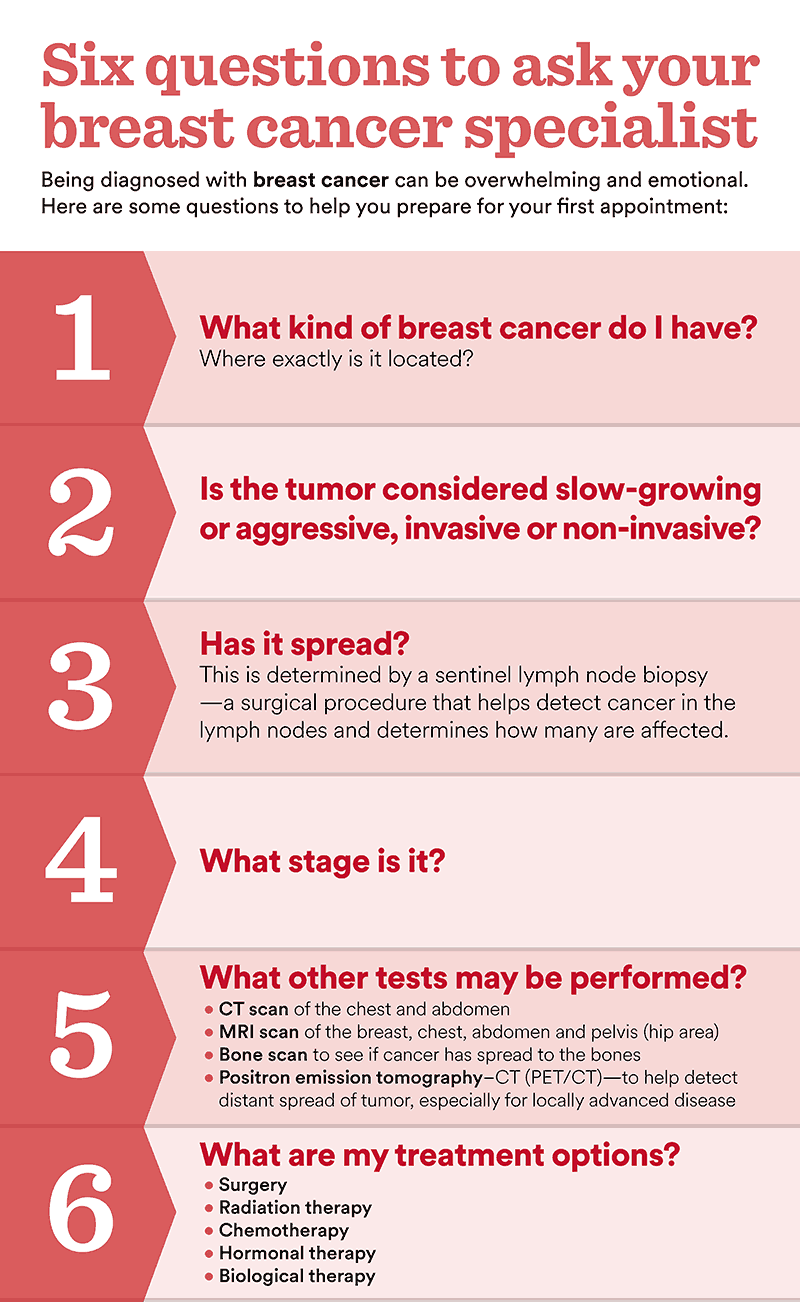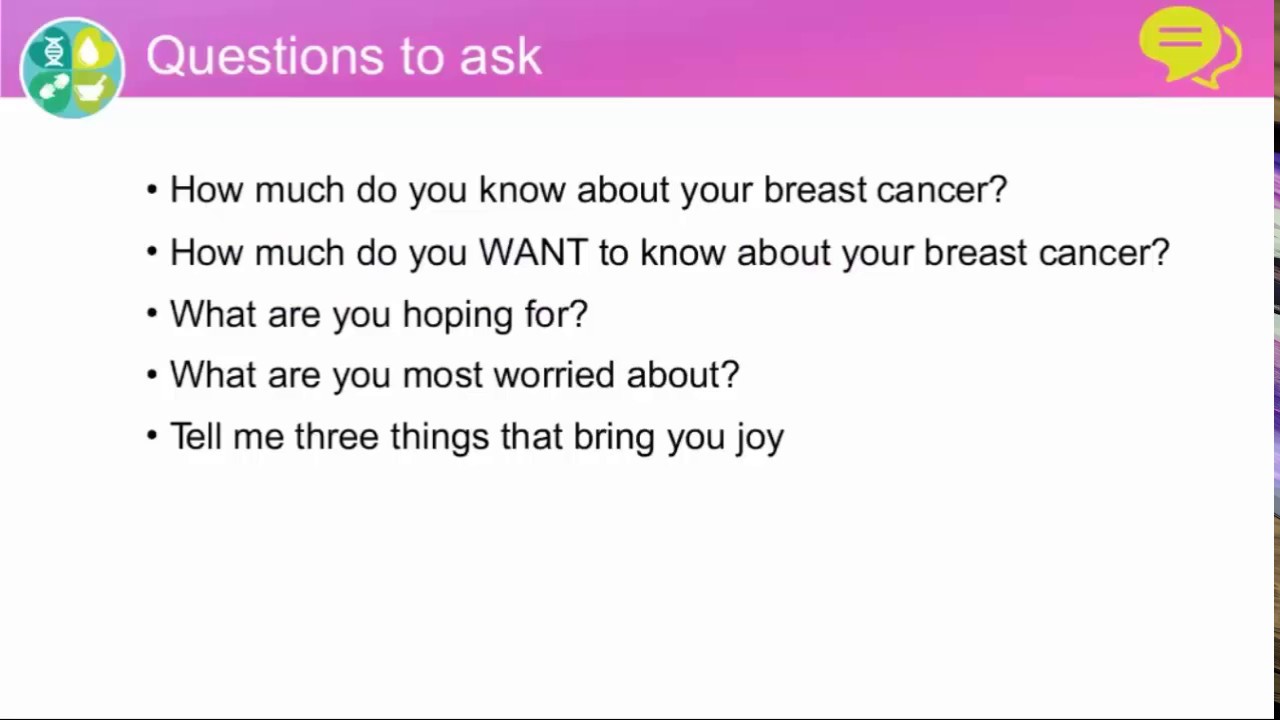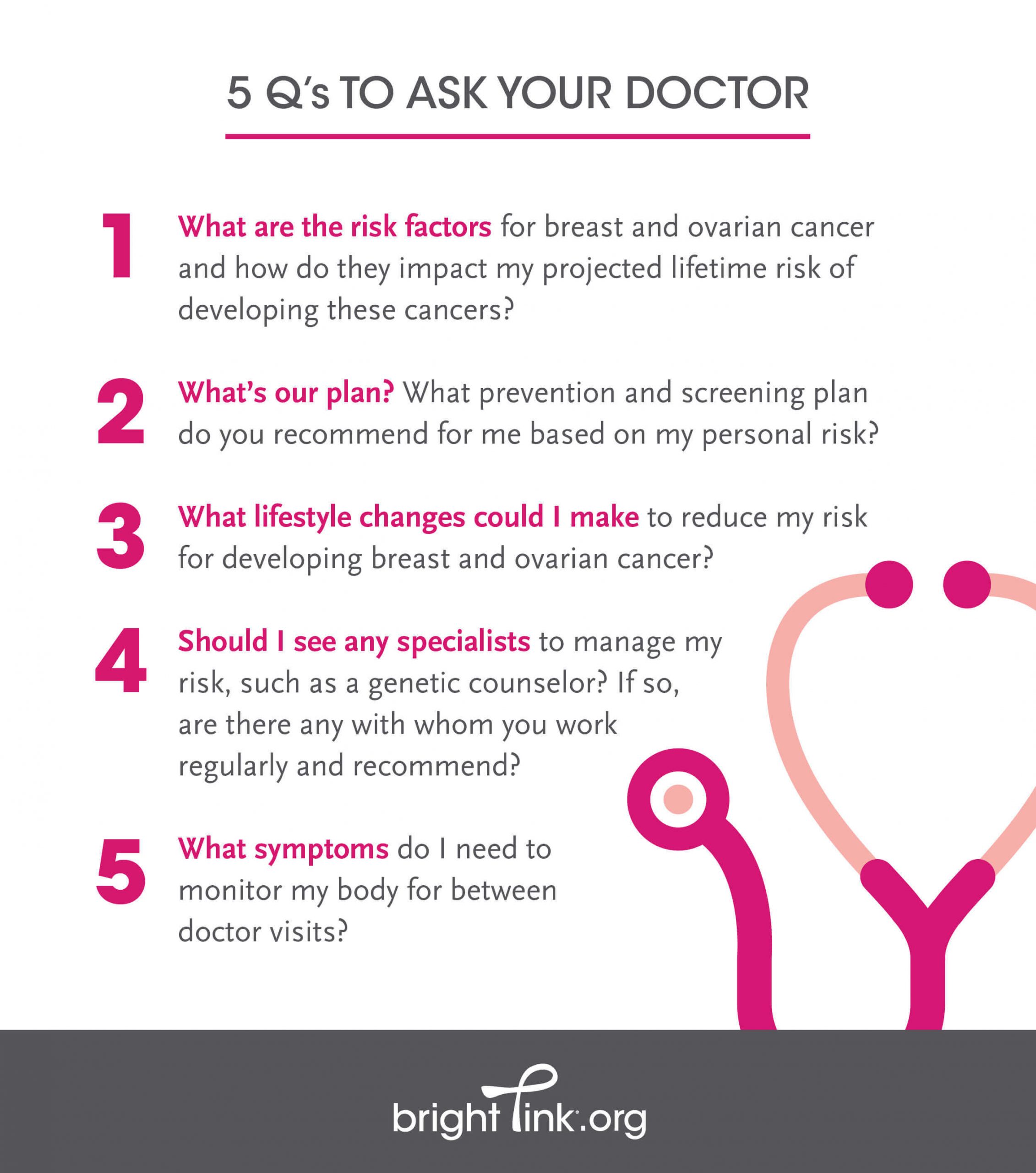Should I Stop Taking Hormone Replacement Therapy After A Breast Cancer Diagnosis
Breast cells are programmed to respond to certain hormones as signals for growth and multiplication. The most prominent examples of these hormones are estrogens and progesterone. Many breast cancer cells retain hormone receptors . The hormone receptors, therefore, make the cancer cells responsive to these particular hormones.
In general, taking hormones is not recommended if a diagnosis of breast cancer is under consideration. This does not necessarily mean that you can never resume postmenopausalhormone therapy. This issue is generally reconsidered after the completion of your evaluation and treatment. You should consult with your physician before you stop or start any new medications.
Questions For Your Breast Surgeon
- What types of reconstruction surgery would you recommend for me and why?
- What are the benefits, limitations and risks of this type of surgery?
- When is the best time for me to have a reconstruction?
- Where can I have this surgery?
- Who can perform this type of surgery?
- If I need to have radiotherapy, will this affect the reconstruction or type of reconstruction I should have?
Questions To Ask Your Surgeon After A Breast Cancer Diagnosis
Medicine has made remarkable strides over the past few decades in treating breast cancer, but one in eight American women are still diagnosed with breast cancer yearly. Early diagnosis is the most important part of ensuring a long survival after diagnosis. If you or a loved one is diagnosed, your surgeon will play an important role in overseeing your treatment plan. Initially, you will meet with several cancer treatment specialists, including medical oncologists, surgeons and radiation oncology professionals, in order to collectively decide on the best course of care. To assist with these consultations, I have listed some questions you should ask in order to determine an individualized plan that works best for you.
What kind of breast cancer do I have?
The two main types of breast cancer include those confined to the ducts or lobules where the cancer remains at its site of origin and has not spread to neighboring tissue, or invasive or infiltrating cancer, which presents as a tumor with the potential to spread to the lymph nodes . Many DCIS cancers can now be diagnosed microscopically and are often curable. Although we cannot prevent cancer, through early diagnosis, doctors can often successfully treat the disease. In the case of breast cancer, early diagnosis can help a woman avoid chemotherapy or loss of the entire breast.
What stage is my cancer?
What are the best surgical options for me?
Recommended Reading: Can Getting Hit In Your Breast Cause Cancer
How Big Is My Tumor
Tumor size is another factor that will determine your course of treatment. Your doctor uses the size of your tumor to stage, or further categorize your cancer .
The tumors dimensions are estimated by a physical exam, a mammogram, an ultrasound or an MRI of the breast. The precise size wont be known until a pathologist studies the tumor after surgical removal.
Where Do You Start

Before making any decisions, gather all the relevant information regarding your treatment options. If you opt for breast cancer surgery, which is one of the standard breast cancer treatments, its important to meet your potential surgeon for consultation before the operation.
The first consultation meeting is typically very long, as lots of information is presented. Its best to bring a friend or family member with you for support. You need someone who can act as a second set of ears and your advocate during this deeply emotional time.
Besides bringing a loved one with you, its important to prepare a list of relevant questions to ask your surgeon regarding your situation. The answers you get can make the decision-making process easier for you. Remember that not all breast cancer cases are the same, and determining the ideal breast cancer treatment approach for you will largely depend on your cases unique characteristics.
The questions you ask may address anything that you feel is important or relevant to you, such as what the benefits of surgery are and why the doctor recommends it.
Recommended Reading: Baking Soda For Breast Cancer
What Is A Lymph Node Biopsy And What Is A Sentinel Node Biopsy
Breast surgeon Laurie Kirstein performs outpatient and short-stay procedures at the Josie Robertson Surgery Center.
During a lymph node biopsy, a doctor removes lymph nodes to see if cancer cells have spread there. A sentinel node biopsy is the removal of a lymph node or nodes under the arm, called the axillary nodes, which are the first nodes to which cancer cells would travel if they were to leave the breast. This is where the fluid, or lymph, from the tumor flows. If cancer cells are traveling in the lymph system, the sentinel node is more likely than the other lymph nodes to contain them.
This procedure is often done during a mastectomy or lumpectomy. To find the sentinel nodes, a special dye, a low dose of radioactivity, or both are injected into the breast. The nodes containing dye or radioactivity are the sentinel nodes, which are then removed and examined under a microscope. If no cancer is found, no other lymph nodes need to be removed, sparing you a bigger operation.
What Is The Tumor Grade
Particular characteristics of breast cancer cells affect how aggressive your tumor is. These include the amount of tumor cells that are reproducing, and how abnormal the tumor cells appear when examined under a microscope.
The higher the grade, the less the cancer cells resemble normal breast cells. The grade of your tumor can influence your outlook and treatment plan.
Don’t Miss: Anne Hathaway Breast
Will I Need Chemo Or Radiation
Following lumpectomy a patient automatically gets radiation, Runowicz says. Whether or not chemotherapy is done is determined by the stage of cancer. In general, tumors larger than 1 centimeter and tumors with positive lymph node get chemotherapy, Runowicz says. A diagnostic test called an Oncotype DX also can be done on a tissue sample removed during surgery. The recurrence score can give information about the likelihood that cancer will recur. This information can be helpful in making decisions about adding chemotherapy to the treatment regimen.
Related:The Best Bras for Everyday Wear
Once treatment is complete you will have follow-up visits every four to six months and continue with yearly mammograms. Read everything given to you about breast cancer and do research on your own. “The more patients know, the easier it is on everyone because they know what questions to ask and what to expect,” says Runowicz, who advises patients to gather information from reputable sites such as the American Cancer Society, Susan G. Komen for the Cure, and the National Cancer Institute.
Should I Have Breast Reconstruction And When
This is another question that has a multi-layered answer. It involves both medical and personal considerations. Some women opt not to have reconstruction. Others believe it benefits their appearance and psychological recovery.
This is another question that has a multi-layered answer. It involves both medical and personal considerations. Some women opt not to have reconstruction. Others believe it benefits their appearance and psychological recovery.
If youre having one or both breasts removed and are considering reconstruction, the stage of your cancer may dictate the timing of the reconstructive surgery. For patients with early-stage breast cancer, Dr. Abraham says immediate reconstruction is reasonable. With a Stage III cancer, you should discuss with your oncologist and surgeon whether immediate reconstruction is advisable.
Recommended Reading: How To Cure Breast Cancer With Baking Soda
Questions To Ask Your Doctor When You Have Finished Treatment
When you have finished your cancer treatment, you will talk with your doctor about next steps and follow-up care. You may want to ask your doctor some of the following questions:
- How long will it take for me to get better and feel more like myself?
- What kind of care should I expect after my treatment?
- What long-term health issues can I expect as a result of my cancer and its treatment?
- What is the chance that my cancer will return?
- What symptoms should I tell you about?
- Who do I call if I develop these symptoms?
- What can I do to be as healthy as possible?
- Which doctor should I see for my follow-up care? How often?
- What tests do I need after treatment is over? How often will I have the tests?
- What records do I need to keep about my treatment?
- Can you suggest a support group that might help me?
Related Resources
How Far Has My Tumor Spread
Understanding what stage of breast cancer you have is important. Ask your doctor to explain the stage to you and find out where else besides the breast any tumors are located.
According to the National Cancer Institute, the stage of your breast cancer is based on the size of the tumor, whether the cancer has spread to any lymph nodes, and whether the cancer has spread to other areas in the body.
Recommended Reading: Why Is Left Breast Cancer More Common
Which Surgical Option Do You Recommend Why
To determine which surgical approach may address your needs and treatment goals, your surgical oncologist may rely on information from the radiologist, who reads imaging tests the pathologist, who interprets the biopsy results the radiation oncologist, who works with the surgeon to plan radiation treatment either during or immediately after surgery and the medical oncologist, to predict how preoperative drug treatment may help reduce the size of the tumor. Depending on the biology and genetics of the tumor, your care team may recommend chemotherapy before or after surgery.
Do I Have To Take My Top Off At The Breast Clinic

Lucy explained how it is important for a surgeon to examine a patient fully if they have noticed a lump or other breast problem.
She said patients or asked to remove their top behind a curtain and the surgeon will look at the breasts before examining.
‘The surgeon will look at the breasts before checkin them by gently feeling all parts of the armpit and breast tissue.
‘The good news is that you will always be offered a female chaperone to be with you.’
She revealed how, under normal circumstances, patients can be accompanied by a partner, parent or friend in the room.
‘You can’t always guarantee having a female surgeon or doctor, but they should always be gentle and explain what they are doing.
‘A breast surgeon examines hundreds of breasts of all shapes and sizes, with all kinds of weird and wonderful diseases and problems.’
She recommended speaking to your doctor before an appointment if you feel anxious and said there is no need to be embarrassed.
Read Also: How To Cure Breast Cancer With Baking Soda
Questions To Ask Your Surgeon About Mastectomy
Here are some questions to ask your surgeon as you plan mastectomy surgery:
- How many times have you performed mastectomy?
- What are the risks of mastectomy?
- How should I prepare for surgery?
- How long will surgery take?
- Will you remove any underarm lymph nodes along with the breast tissue?
- What kind of anesthesia will I have?
- Will I need blood transfusions? Should I donate my own blood before surgery?
- If I have immediate breast reconstruction, how will my breast look after surgery? What are the risks of having reconstruction surgery?
- If I choose not to have immediate reconstruction, how will my chest look after surgery?
- Will I be at risk for lymphedema after surgery?
- How long will I stay in the hospital?
- How long will it take to recover?
- Are there any precautions I should take as I recover? Will you give me written instructions to follow?
- Are there exercises I need to do after surgery?
- When can I return to my normal routine and activities?
While Taking Decision On The Treatment Plan
Once breast cancer is diagnosed one must seek consultation from the best doctor for cancer and start treatment immediately so that the problem does not aggravate. If visiting a doctor physically is not possible, you can ask an oncologist online.4. What are the different treatment choices available for breast cancer?5. Is it good to take part in some kind of clinical trial for breast cancer?6. What will be the length of the treatment and how will be the whole process like? Moreover, where will be the treatment done?7. Are there any kinds of side effects of the treatment for breast cancer? Suggest ways for preparing for the treatment of breast cancer.8. Are there chances of cancer making a comeback even after the whole treatment process?
Also Check: What Is Stage 3a Breast Cancer
What Has Been Done To Exclude Cancer In Other Areas Of The Same Breast Or In My Other Breast
Unfortunately, there are some patients who may have more than one area of malignancy in the same breast or even an additional malignancy in the other breast. If this does occur, it can greatly change the recommendations for treatment.
Therefore, it is critically important that your doctors carefully investigate beyond the immediate site of the tumor to make certain there are no other areas with possible malignancy.
Sometimes discovering these “secondary” areas requires careful review of your mammograms. It may also require the addition of special views from different angles and specialized examination of your breasts by ultrasound, MRI, or other imaging techniques. Sometimes imaging techniques will be used to evaluate the rest of your body, as well.
Will I Need Chemotherapy
Typically chemotherapy is a consideration for patients with high-risk breast cancers. Some factors that may indicate the need for chemotherapy are:
- Lymph node involvement.
- Tumors that are higher-grade, ER/PR-negative, HER2-negative or triple-negative .
- Tumors that are HER2-positive.
- Breast cancers in younger patients, especially those below the age of 40.
If you need chemotherapy, it will be given as an outpatient treatment every two to three weeks, delivered either directly into a vein or through a port.
Also Check: Did Anne Hathaway Have Breast Cancer
Should Breast Cancer Patients Have Their Lymph Nodes Removed
Lymph nodes are small glandular structures that filter tissue fluids. They filter out and ultimately try to provide an immune response to particles and proteins that appear foreign to them. There are thousands of these nodes scattered in groups throughout the body. Each cluster is more or less responsible for the drainage of a particular region of the body.
The lymph nodes under the arm are the dominant drainage recipients from the breast. When cancer cells break free from breast cancer, they may travel through the lymph tubes to the lymph nodes. There, the cancer cells may establish a secondary growth site. The presence of cancer cells in the lymph nodes proves that cancer cells have traveled away from the primary breast tumor. Therefore, the presence or absence of cancer cells in these regional nodes is an important indicator of the future risk of recurrence. This information is often important in making decisions about whether to use chemotherapy and what type of chemotherapy should be employed.
Unfortunately, removal of the lymph nodes also carries a potential risk of lymphedema, a condition that may cause the arm to swell. Lymphedema can occur early after surgery or many years later. It can be a difficult and disabling condition. Here again, there are tradeoffs in risk. When more lymph nodes are removed, more accurate information about tumor spread is obtained and the chance for tumor recurrence is less. But there is a greater incidence of lymphedema.
Important Questions To Ask After A Breast Cancer Diagnosis
When a loved one learns she has breast cancer, she’s most likely to seek advice from someone who has been there. Even if you haven’t there are ways you can help. One of the most helpful things to do for someone with breast cancer is offer to accompany her to appointments and suggest questions to ask the doctor. “I always recommend that patients take someone along to offer emotional support and be an extra set of ears,” says Rosalind Benedet, RN, NP, director of Breast Cancer Recovery at California Pacific Medical Center in San Francisco and author of Understanding Lumpectomy: A Treatment Guide for Breast Cancer. Below are some questions to get you started when talking to your doctor.
Also Check: What Does Triple Negative Cancer Mean
What Is A Sentinel Lymph Node Biopsy And What Are Its Benefits And Risks
A sentinel node biopsy takes advantage of a peculiar physiologic and anatomical finding. Although there may be many lymph nodes in a particular drainage region, it appears that only one or two are the first recipients of the regional fluids.
This means that if any nodes will be involved by tumor spread, the sentinel node will be the first. It also means in general that if the sentinel node is not involved, then no other nodes will be affected. Therefore, only the sentinel node needs to be removed. There are techniques for removing just the sentinel nodes. A sentinel node biopsy allows the pathologist to more intensively study this node and apply specialized techniques that are capable of detecting even a few cancer cells.
Were Her2 Tests Performed On My Tissue Sample

HER2 is a type of growth signal receptor, or antenna that may be present on your breast cancer cells. About 25 percent of breast cancers are HER2-positive, meaning the cancer cells make too much of a protein called HER2/neu, which indicates that the cancer may be more aggressive. If your cancer is HER2-positive, this helps doctors better predict whether the cancer may respond to certain targeted therapies.
You May Like: Can Stage 3 Breast Cancer Be Cured